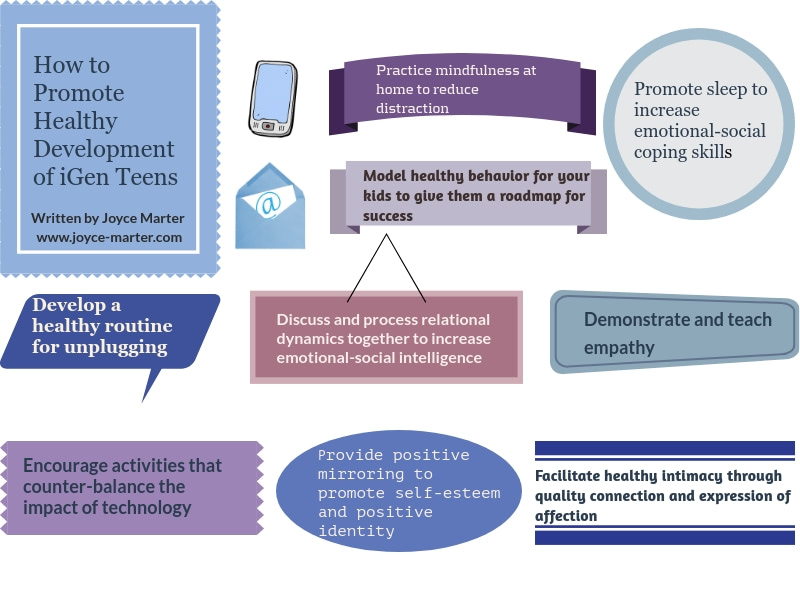In her popular article, Have Smartphones Destroyed a Generation?, Jean M. Twenge refers to the “iGen”—those born between 1995 and 2012 that have been shaped by smartphones and social media. She says that while this generation might be physically safer than adolescents have ever been (because they’re “more comfortable online than out partying”), they are “on the brink of a mental health crisis.“ She adds that the research says, “The more time teens spend looking at screens, the more likely they are to report symptoms of depression.”
As a licensed psychotherapist with over 20 years experience and as a mother of two iGen kids, I share these concerns about the impact of technology on adolescents’ psychosocial development. I worry that the overuse of technology has caused kids to become disconnected with themselves, one another, and the world around them—putting them at higher risk for anxiety, depression and suicide.
In my practice and in my own experience as a parent, I’ve seen that overuse of smartphones and social media has made it more challenging for kids to develop:
- Communication skills (including basic manners)
- Conflict resolution tools
- Emotional intelligence
- Positive sense of self/identity
- Self-esteem
- Healthy intimacy (emotional and physical)
- Appropriate relational boundaries
- Kindness
What can parents do to counter the negative impact of technology and help promote healthy emotional-social development for iGen teens?
1) Develop a healthy routine for unplugging.
- During mealtimes.
- At least 30 minutes before sleep (this is a great time to read.)
- When friends come over to hang out. Consider collecting phones in a bucket as kids come to the door for birthday parties or other gatherings. Your kids may whine and complain, but they will see that they will have a good time connecting directly with their buddies.
- During vacations. Or perhaps allow a one hour check-in in the mornings or at the end of the day.
- Consider using apps like SelfControl! and FocusWriter that shut down social media sites to promote concentration on homework and other activities.
- Consider using devices like Circle with Disney that pair with your wifi network and give you the ability to control your kids’ internet activity.
- Avoid power struggles. Set healthy boundaries and detach from any drama coming your way from the kids. Collaborate and work together to achieve healthy balance with technology.
2) Encourage activities that counter-balance the impact of technology.
- Art (for cathartic expression of emotion, development of sense of self, etc.)
- Animals (for tactile experiences, connection, care-taking, etc.)
- Sports (for teamwork, collaboration, communication, self-esteem, etc.)
- Physical activity (exercise, energy release, etc.)
- Connection with nature (for connection with the other senses and the present moment)
3) Promote sleep to increase emotional-social coping skills.
- Practice good sleep hygiene by turning the screens off and perhaps even getting them out of the room.
4) Discuss and process relational dynamics together to increase emotional-social intelligence.
- Take the time to discuss relational dynamics in your family, friendships, movies, shows, books, and in the here-and-now while at the dinner table or running errands. Find those teachable moments and taking the time and energy to use them wisely.
- Teach your kids effective conflict resolution strategies and role play ways to resolve interpersonal challenges.
-
Encourage the development of healthy boundaries and empower your kids to use healthy assertive communication to advocate for themselves and set limits with technology, friends, family, etc.
5) Provide positive mirroring to promote self-esteem and positive identity.
- Help your kids know themselves and their strengths by verbalizing how you see and understand their gifts and strengths (“you are a wonderful leader”, “you are a gifted artist”, “you are thoughtful and caring”, etc.)
6) Demonstrate and teach empathy to improve self-esteem and relationship success.
- Help them consider the feelings and perspectives of others, even when watching shows and movies.
- Express compassion for others, including animals.
- Teach openness and acceptance.
7) Practice mindfulness at home to reduce distraction.
- Encourage mindfulness practices such as deep breathing, meditation, yoga, and progressive muscle relaxation that bring our attention to the present moment.
- Consider apps like Headspace or Calm for guided meditation
8) Facilitate healthy intimacy through quality connection and expression of affection.
- Create a ritual for 20-minute a day check-ins. Perhaps it is at breakfast, while walking the dog in the evening or before bed. Ask open-ended questions. Respond without judgement. Take the time to share appropriately about yourself (your interests, your hopes and dreams) to give your kids a sense of who you are with which they can connect.
- Develop routines of doing things you enjoy together at least once a week (shooting hoops, sketching/coloring, gardening, cooking or baking, etc.)
- Tell them you love them and provide them with words of affirmation. Say the 50 loving sentiments we should all say more often.
- While respecting your kids’ boundaries and need for space and privacy, give hugs and kisses. For those older kids that may be resistant, offer a foot or neck rub or a DYI mani/pedi–the power of healthy touch can be very relaxing, healing and connecting.
9) Model healthy behavior for your kids to give them a roadmap for success.
- Be a role model for a healthy relationship with technology, yourself and others.
- Find mentors and positive role models for your kids.
- Teach your kids how to be a better person and value kindness above all.
“With awareness and mindfulness, technology can be a friend, not a foe. With awareness and mindfulness, we will also know how to put it down when we need a break. Just as we do with other things that we might love but that may not always serve us well, we can recognize our love of technology and then let it go.”
~Kevin Neufeld, Author of I Love Technology: Practicing Mindfulness and Valuing Technology
Check out the full blog post at: https://blogs.psychcentral.com/success/2017/11/how-to-promote-healthy-emotional-social-development-of-igen-teens/





































